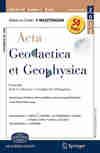Why research into the history of geosciences
引用次数: 2
Abstract
Study of the history of various sciences is rather heterogeneous. Some disciplines, such as medicine, mathematics, and astronomy, have numerous noteworthy compendia and even specialized journals where papers on the history of these sciences can be published. The situation in geophysics, meteorology, and other subdivisions of the geosciences is far less favorable. This neglect is an outcome of a dogma of autonomy that is essentially oriented toward progress in understanding, without much reference to historical developments. But even the geoscientists cannot ignore that the phenomenon ‘science’ must be viewed in the context of sociological processes. In the initial stages, sociologists and some philosophers, in the context of the general theory of perception, began research into the development of scientific thought, but the geoscientists and other natural scientists contributed very little. It has since become clear that research on these topics requires historical assessment and more insight. The development of the ‘science of science’ is directed toward understanding and explanation of the complex human involvement in science, not only in the sense of theorizing about the scientific processes but also in sociological, political, and historical context [Kuhn, 1973; Burrichter, 1979; Sandkuhler and Plath, 1979.]为什么要研究地球科学史
对各种科学的历史的研究是相当复杂的。一些学科,如医学、数学和天文学,有许多值得注意的纲要,甚至有专门的期刊,可以发表关于这些科学历史的论文。地球物理学、气象学和地球科学的其他分支的情况就差得多了。这种忽视是一种自治教条的结果,这种教条本质上是面向理解的进步,而没有太多参考历史的发展。但是,即使是地球科学家也不能忽视,必须在社会学过程的背景下看待“科学”现象。在最初阶段,社会学家和一些哲学家在一般知觉理论的背景下,开始研究科学思想的发展,但地球科学家和其他自然科学家的贡献很少。从那时起,很明显,对这些主题的研究需要历史评估和更多的洞察力。“科学的科学”的发展旨在理解和解释人类对科学的复杂参与,不仅在科学过程的理论化意义上,而且在社会学、政治和历史背景下[库恩,1973;Burrichter, 1979;Sandkuhler和Plath, 1979。
本文章由计算机程序翻译,如有差异,请以英文原文为准。
求助全文
约1分钟内获得全文
求助全文

 求助内容:
求助内容: 应助结果提醒方式:
应助结果提醒方式:


